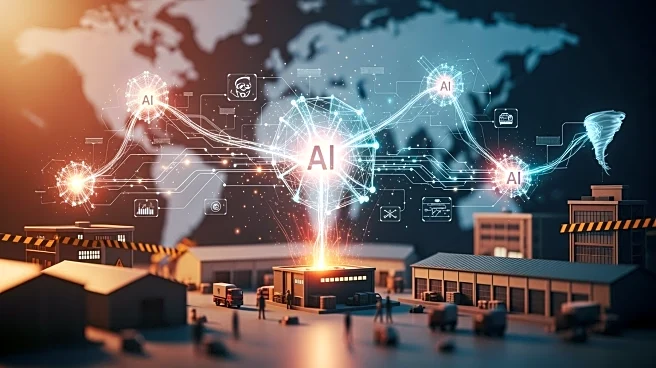What's Happening?
Prologis, a San Francisco-based real estate investment trust, has released a report titled '2026 Prologis Supply Chain Outlook,' which examines the future of supply chains over the next decade. The report is based on feedback from over 1,800 senior executives
across the United States, Europe, Asia, and Mexico. It highlights a fundamental transformation in global supply chains driven by AI, regional self-sufficiency, and energy resilience. Dubbed 'The Great Recalibration,' the report indicates that 82% of respondents are optimistic about 2026 but are implementing significant changes to enhance resilience. These changes include deploying new technology, installing risk monitoring systems, and maintaining safety stock. Additionally, 58% of respondents are focusing on regionalized supply chains by 2030 to decrease the distance between production and consumption and diversify sourcing.
Why It's Important?
The report underscores the importance of supply chain resilience in the face of persistent disruptions. By adopting AI and regionalization strategies, companies aim to improve efficiency and responsiveness, which are crucial in an unpredictable global environment. The shift towards regionalized supply chains can potentially reduce dependency on distant suppliers, thereby mitigating risks associated with long-distance logistics. Furthermore, the integration of AI into supply chain operations is expected to enhance decision-making processes in logistics, procurement, and inventory management. This transformation could lead to more stable and reliable supply chains, benefiting industries that rely heavily on timely and efficient goods movement.
What's Next?
As companies continue to adapt to these changes, they may face challenges in finding suitable locations with the necessary talent, supplier networks, and infrastructure. The competition for real estate in attractive production and distribution areas could outpace infrastructure growth, requiring strategic planning and collaboration with local municipalities. Additionally, companies are encouraged to diversify energy sources and improve backup systems to counter energy-related disruptions. The ongoing adoption of AI is expected to drive most supply chain decisions by 2030, further transforming logistics and operational efficiency.
Beyond the Headlines
The report suggests that the focus on energy resilience and regionalization could lead to long-term shifts in how companies approach supply chain management. By prioritizing local production and energy reliability, businesses may contribute to more sustainable practices and reduce their environmental impact. This shift could also influence global trade patterns, as companies seek to balance efficiency with resilience in their supply chain strategies.














